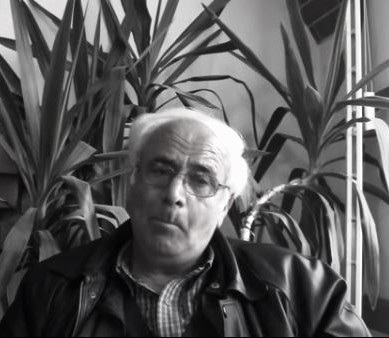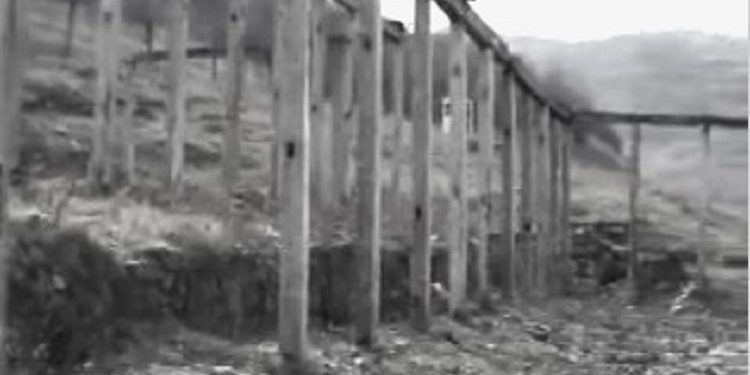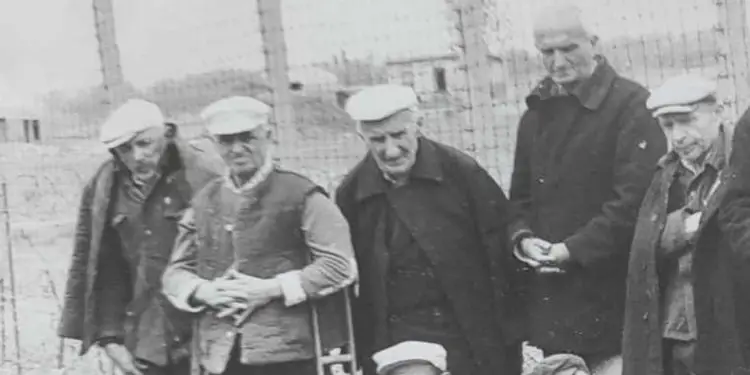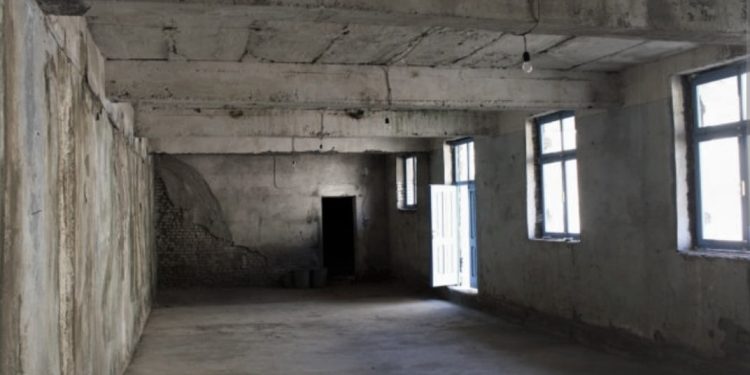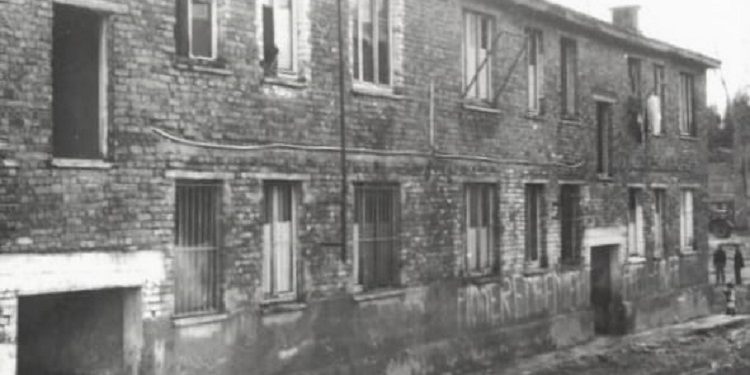Memorie.al / Muhamet Gjyli, originally from Bilishti in the province of Devolli in Korça, witnesses the life of an “enemy’s son”, with great vicissitudes, from his childhood until the collapse of the communist regime, who gave him the best jobs difficult and kept him under surveillance and pressure, as well as the long ordeal of their family, where all his uncles ended up in prisons and exiles of the communist regime of Enver Hoxha and his successor, Ramiz Alia. A child’s memories of the day his father was arrested and the difficult roads, when he went to meet him in the many prisons where he was serving his sentence, such as: Ballsh, Reps, Spaç, Tirana, etc. For more about this, etc., see the interview with Mr. Muhamet Gjyli, which was taken from the Doko family archive.
Mr. Muhamet, what is the origin of the persecution of your family?
I was born in 1955 and come from a middle-class family. The persecution of our family began at the beginning of 1945, that is, a few days after the end of the war. My father Ramadan had six brothers, seven himself, and two sisters. The younger uncle, Nazer Gjyli, had been a militiaman during the occupation period. He was arrested by the communist regime, because he was an employee in the offices of FASHO, in Korça, they accused him of burning the offices, arrested him, put him in prison. He was a powerful, powerful body. In early ’44, they took that too. He opened the Korca prison at the beginning of ’45.
He brought out all those people who had been there in prison, like Emil Xhaxhavica, and many others. There were 13 people. They injured him. He brought them out, who fled, escaped. Then, according to the mother’s, father’s and uncles’ statements, they wounded him and killed him only with wood. So they massacred him. At the beginning of ’46, they took the great uncle in prison, Shaban Ali Gjyli and another uncle, under this great, Selami Ali Gjyli. They took them both, after the brother was killed, they took them both to prison. They were released with the amnesty of 1949, of Koçi Xoxes, they were both released. After these two were released, the great uncle did not even manage to stay here for a few months, he was exiled to Tepelena.
What happened to the other uncles?
In ’51 they took another uncle, Ibrahim Gjyli. He was Sei Bylykbashi’s brother-in-law, he married Sei Bylykbashi’s sister. They took him and interned this too, in Krutje in Lushnje, where he died. The other uncle, Shaban, who was taken for the second time, was shot in Tepelena, and from the Tepelena camp, shot in Savër i Lushnja, together with his family, as it was. He also passed away there, in 1954, that is, Shabani. And Ibrahimi, this other uncle, who was Sei Bylykbashi’s brother-in-law, changed his life in ’57, in Shtyllas of Fier, where he was interned. In ’56, a son, Shabani, who was a soldier, was killed.
Since he had a bad biography, as they said at the time, they forced him to disassemble the dynamite, extract the gunpowder from the shells, which he needed for work, in the quarry. This, the nephew, was also killed.
And after all these events, i.e., arrests, imprisonments, deaths, deportations, what happened next to your family?
The course of our lives continued for a while, and we were no longer harassed. So, it’s been 10 years since they touched us. On December 16, 1968, they took the father to prison, accusing him of agitation and propaganda and possession of weapons without a permit, because he had a revolver. As if all these brothers were not enough, one of them was killed, two of them died in exile, they took the father and put him in prison. I was 13 years old when my father was taken to prison.
Do you remember your father’s arrest?
It was Monday, December 16, 1968. I was 12, about 13 years old. I was at home. Mother’s sister, that is, our aunt, had taken our mother home, as much as we called mother aunt and aunt, we called mother, because she had no children. I had come from school and was staying at home. It was lunch time. At that time, the former operator, Xhezmi Ahmeti, some officers of the Korça Security, the members of the People’s Council of the city come to the house, because before them, it was a rule that these Security did not check the house. They entered the house, it was me, my mother and my aunt. – “This is Ramadan Gjyl’s house”? they asked “Yes”, I told them, being a 13-year-old boy.
They tell the mother that; “We have arrested Ramadan because he is an enemy of the people.” The mother says: “You know”. – “But we have information that there are weapons here”, they say. – “I don’t know,” says the mother. – 25 years of liberation, we still have weapons”. However, he had it, a revolver, he had put it in the basement, I even took it and looked at it when he was cleaning it. I say to the mother: “I’ll take it, take away the revolver”? My mother tells me: “Wait, because they know something, they didn’t come, they didn’t come in vain”! They found the gun.
They took, confiscated a bicycle, a radio, they were left, because in our house, there were four seizures: immovable and movable property, cattle, dogs, and a pair of seized houses. Whereas then, they had nothing left to take. They took the gun. They say to the mother: “Do you see this?! I will hold it on your forehead”! And in conclusion, they brought the father to court and told him: “You spoke, you cursed the government… but the gun, why did you want it”?!
How did your father respond?
I was small and I was impressed when my father said: “I wanted to kill some communists, here in Bilisht”. – “And who?”, asked the judges. And the father said; so-and-so… so-and-so, he even called them names. – “Yes, why do you want to kill them”?! they continued again – “Because they destroyed my family. We are a family that has never fallen on man’s neck, we have never harmed man”. The father had five children, four sons and one daughter. The oldest was 18 years old. The two older ones did the army in Buna, while I did it in construction, and so did the younger brother.
Where did your father serve his sentence and did you meet him while he was in prison?
My father spent five years in Spaç. From Repsi to Spaç, I have done that road three times.
What do you remember from those trips and meetings?
I will tell you the first one, when my father was taken from the trial and taken to the Tirana prison hospital. However, he was very bloated from the medicine, he was very fat. When he appeared in court, he was a disgraced person, he was a different person, very weak. About 10-12 of us went to the hospital. He even says to his aunt about me: “Whose son do you have?”?! His aunt had told him: “What are you talking about, Dane?! This is Matt”! Of course…! He was very sick. In conclusion, they pierced him in Spaç. I went to Spaç three times, while my mother, my brothers, we also had an uncle, (a very good man, he worked as a driver), more…!
From Repsi to Spaç, it was about 3-4 km, or more. A road, at the foot of the mountain. Loaded with bags we. From Repsi to Spaç, no driver would take you, we were forced to sleep there one night, after the meeting. When you went up, on the left side, there was the camp, on the right side, there was a barangay, and up, there was the road that took out these trucks that were loaded there with ore. We stayed there, sleeping, because it was impossible to return.
Biles, one night, the second time, I was with my great uncle’s son, there were also two from Kukës, at that time, they gave us those blankets that we brought from home, that uncle’s son, he had a raincoat, it burned in the fire, because we lit a fire because it was cold. When we came back, he could pick us up, if a Shkodran driver happened by, what were these, the mirditors, impossible. When we ran away, it was impossible, but even when we came back, it was like shooting. I drove twice, walked once, to Reps. Then they transferred him to Ballsh. It happened that I was a soldier in Gjirokastër, the year was 1973. My father was in Ballsh, I was in Gjirokastër.
I spent a year or so in Gjirokastër, the rest of the time in Tepelena. We had a company commander there, Vangjel Malta, he was a very good man. He gave me the usual permission and I left. The bus was going; Korçë-Tepelënë-Gjirokastër, even when you came back, like this. Even the permit, if it was seven days, was given to us on Monday or Thursday, because on those days, there was a bus. But I had to go see my father in prison. I received the permission slip, headed for Ballsh. I remember, I took 10 packs of “Partizani” cigarettes, put them in a long plastic bag, went to the camp, registered my name.
When he finished recording, he said to me: “Come on, go a little further, the guard officer is looking for you”. Myself there. It was the officer of the guard, a man with a moustache, lying on the bed. – “Why did you come here”? he tells me. – “I came to see my father.” – “Yes, it is not allowed, he is an enemy.” – “He may be an enemy, but he is my father. Then, if it was not allowed, they might not allow us to come”! – “Yes, you are also a soldier…”! And he started talking…! What to say to him, I could not contradict him. – “Okay,” he tells me, “Go and meet him.” I ran away, I met my father.
I got up that night alone at the “Liberation” Farm, because I couldn’t go home, I had my people there. When I return to the department, the company commander tells me: “Hey Mehmet, where did you come from”?! – “Yes, I ran away from Fieri, commander.” – “But why did you leave Fieri?! Why didn’t you go by bus”?! I tell him: “Yes, my father is in prison, in Ballsh, and I went to meet him.” He was a very good man. “Hey,” he said, “but why do you remember that we don’t know? That when you arrived, our phone rang. They told us: Should we leave him or not?! That he really has permission, but what kind of person is he?”?! And yet, there were also good people. Then, while working, think to yourself, how could we be.
How many years was the father sentenced?
The father was sentenced to 10 years, 8 years for agitation and propaganda and 2 years for carrying weapons without a permit. He has served 9 years and eight and a half months in prison.
How were you treated during this time?
We had most of the people interned in the area of Myzeqe. In the discussions they had, even they themselves told us: “It’s worse, you are here, than we are there”, because a family is devastated, killed, condemned…! Calculate, here in Bilisht, we have four brothers, the army, two did it in Buna, two in construction. Works: mining, geology, reclamation. We worked because we were working people, our parents were also working people, because they had almost 300 dunyms of land. They told us: “You work because you are afraid”, to harass us.
Were you being monitored during this time?
A lot, a lot. That uncle, who I mentioned, helped us a lot, he taught us about these surveys that were done to us. But the worst period, for us, was the time of the army. Then, when we were called to be soldiers, one night, we had to stay in Korça, because you had to report early in the morning, at 6:00 a.m. to the Military Branch, or as they call it today, the Recruitment Office. We also stayed at my uncle’s. He would take us to dinner, send all the children away, take us alone and tell us: “If you are going to fall prey to the State Security, you are a burnt card, don’t try to live anymore.”
It was his way, how he spoke to us, out of love, out of compassion. He told us: “They will do this, they will do that, you will try not to accept anything. If things go wrong, you will say: “Hey, what I do during the day, I talk about at night. You will sacrifice, a week, even a month, so that you stay without sleep, you will pretend to talk, as if you fight with your friends”. They happened to us too, just as my uncle ordered. It happened to me, I tried it myself.
What happened to you, specifically?
I became a soldier on November 27, 1973. I went to Gjirokastra as a soldier. There we had a commissar, Flamur Bilica, a 30-year-old boy, young. He was a good man, so it seemed from the outside. We worked in plaster, built the officers’ house. It didn’t even take two months, he sent me on leave. Not even the oath was taken. I came home on leave, how surprised they were. I went back there, it welcomed me well…! Then, he started harassing me. He told me: “Look, we know that your family is a very good family. You have helped the War, you have done this, that, despite the fact that some mistakes were made, but you will look at so-and-so, so-and-so, because you have them from your area”.
Don’t call them names. “You’ll see what they talk about,” he told me. -“Yes, I am not for these things. We are burned ourselves. They, too, do not approach me.” I had people from our area: from Poçara, Mustafa’s son, who had killed his father, I had a Myfterem Hoxha, from Cangonji…!
How did you resist the pressure to become a spy for your friends?
I resisted saying that; they don’t approach me and I talk at night. So, the lessons my uncle used to teach me. From the time he sent me on his first leave, then, he didn’t want to look me in the eye. In ’74, the incident and the convictions of Petri Dumas, Beqir Balluku, etc.
At that time, I burned two fingers with a greenhouse, or pitch as they say. When I took the boiler of the greenhouse, because then the working conditions were primitive, I burned two fingers and they gave me a medical report. Company commander, we had a Ramadan, he was a very good man, he was over 50 years old.
He had respect for me and wanted to issue me a permit, based on the medical report, but then, the permit was issued either by the Corps commander, or by the Corps Commissar, or by the Chief of the Corps Staff. Enter this one, both of these, but they looked at the file and did not give permission. Then he says to me: “Ore, what do you have?! That when they see the file, they don’t give permission”?!
But I, too, had respect for him and told him the truth: “Commander, if it’s about black people, what can be written about me, I have them in the file.” He told me: “Since you were honest with me, I will help.” He received it from the Chief of Staff of the Corps, my signature. Even at that time, there were good people, I had both the company commander in Tepelena and the company commander in Gjirokastër. They were very good people.
Where did you work after the army?
As soon as I left the army, I started in Bonification.
Did you start a family?
As a family with a bad biography, here in Devoll, they didn’t give us brides, that’s why I got my wife in Lushnjë. My brother also took part in the “Liberation” Farm. They were exiled, they were not from there. His father was from Koshnica, his mother from Cologne, they were interned. And the younger brother took his wife from Alarupi, but exiled to Shtyllas. The second brother took him from Mallakastra, but interned at the “Liberation” Farm. We couldn’t get brides here.
How did you expect the regime changes?
These moments were among the best for us. But they were also a little suppressed by the people, because Bilishti was a small place. When it comes down to it, the secretary of the Democratic Party calls me, we talked a lot, they were good, honorable people. He tells me: “Meti, I’m looking at you, that you are not approaching from the DP”. I said to him: “Where were the first signatures for DP”?! -“They were taken from your family”. – “Yes, why do you want us to get closer”?! – “I ask for it, because it belongs to you”, he told me.
– “Yes, it’s not up to us, because we don’t have it at school, but we don’t lack intelligence! Now, after whom shall we come…”?! And I tell him some names, that there were three or four people who had been in the People’s Council of the city. That is, in short, we had the biggest league of them. I told them: “We are not coming to you there. You have the vote, as long as we are, you have it, but we don’t become members of the DP”. Memorie.al




